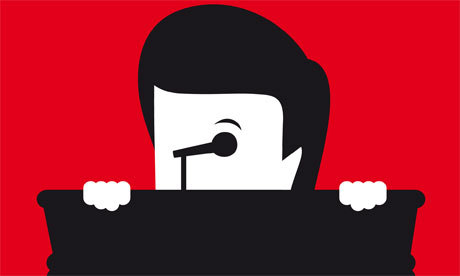
The notion that more people are scared of public speaking than death or snakes is one of self-help's favourite scientific-sounding claims. But even using only 10% of my brain (another bit of pop-psych horsefeathers), I can tell it's dodgy. More scared because it's scarier? Or just because most of us don't need to think about snakes, and try not to think about death? Apart from inspiring a Seinfeld line ("To the average person, if you go to a funeral, you're better off in the casket than doing the eulogy"), the claim turns out to be largely worthless: it's based on a 1973 Sunday Times article, citing research by a now-defunct polling firm, their methodology lost to history. Which, one suspects, is exactly how public-speaking coaches who ceaselessly repeat this mantra like it.
If it resonates, though, that's partly because public speaking is a crucible for what psychologists call "the illusion of transparency" – the certainty we have that our emotions, such as panic before a crowd, are written all over our faces. In truth, we're more enigmatic. (In one study, people were asked to taste liquids, including some disgusting ones, and hide their reactions; when questioned, they assumed their reactions would be obvious to onlookers far more than they were.) But the illusion's cruel irony is that believing in it can make it true: convinced we're coming across terribly, we try to act calmer, kickstarting a vicious cycle of self-correction that does indeed end in detectible panic. If we'd known how little panic we were betraying, perhaps we'd have panicked less.
The illusion also sabotages our efforts to convey meaning. "We always know what we mean by our words," as the blogger Eliezer Yudkowsky puts it, "and so we expect others to know it, too." A non-verbal example: think of a famous tune and tap out its rhythm for a friend. When the psychologist Elizabeth Newton tested this, people assumed the song would be detected half the time; the real figure was 3%.
This is all another demonstration of the way our perceptions are hopelessly distorted by the unique vantage-point we have over our own thoughts and emotions. Tapping out Happy Birthday, you can't not hear the tune; panicking as you step to the podium, you can't not feel your emotions. Any assessment of how other minds are responding begins, of necessity, in your own; you can't step outside. Seen this way, the oft-noted trickiness of conveying sarcasm in email isn't a unique phenomenon of the online era: it's a microcosm of all human communication. I know what I mean. How can you not?
But this needn't be depressing. First because, as the researcher Thomas Gilovich discovered, in a study highlighted at the always readable YouAreNotSoSmart.com, "the truth can set you free": merely knowing about the illusion frequently halts the vicious cycle that makes public speaking so distressing. And second because – even though it's the title of a 1970s self-help book of the cheddarish variety – there's wisdom in the observation that "what you think of me is none of my business". You can never fully grasp, much less control, how others see you. So don't waste too much energy trying.
• A collection of Oliver Burkeman's columns, Help!: How To Become Slightly Happier And Get A Bit More Done, is published by Canongate at £12.99. To order a copy for £10.39 (including free UK mainland p&p), go to theguardian.com bookshop, or call 0330 333 6846.
oliver.burkeman@theguardian.com

